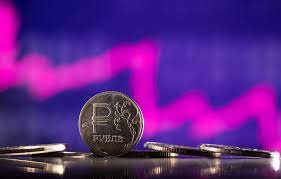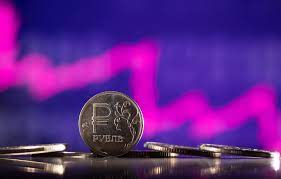
Next week, the price that Russia will be paying for its invasion of Ukraine will become further evident, with a hitherto inconceivable sovereign default approaching, additional emergency central bank measures expected, and a stock market fall assured if the market reopens.
The West has cut Russia off from crucial portions of the global financial markets as a result of Moscow's "special operation" in its former Soviet neighbor, sparking the country's greatest economic catastrophe since the fall of the Soviet Union in 1991.
Another low might be reached on Wednesday. Two of the government's dollar-denominated bonds are set to be paid for $117 million. However, it has indicated that it would not, or that if it does, it will be in roubles, implying a default.
It has a 30-day grace period in theory, but that is a minor point. It would be the country's first international default since the Bolshevik revolution more than a century ago if it happened.
"Default is quite imminent," said Roberto Sifon a top analyst at S&P Global which has just hit Russia with the world's biggest ever sovereign credit rating downgrade.
The fact that state-run oil giants Gazprom and Rosneft have recently completed foreign bond payments and have over $200 billion in still-unapproved government reserves gives some hope that this will not happen, but the odds are stacked against them.
Wednesday might be busy for a variety of reasons.
Central bank and Moscow Exchange insiders told Russia's Vedomosti financial daily this week that banned domestic share and bond trading might resume by then.
At the very least, it would be chaotic in the short run. When the crisis erupted, Russia's major corporations, which were also listed on the London and New York stock exchanges, had their foreign shares plummet to nearly nothing, and they have now been halted.
"There are many financial institutions that are sitting on Russian assets that they want to get rid of but they can't," said Rabobank currency strategist Jane Foley.
"They have no real option but to sit on them. But that means that when they are allowed to trade, the selling could be quite persistent."
It's not going to end there. Russia's central bank is set to convene on Friday, having already raised interest rates to 20% and implemented sweeping capital controls in an attempt to avoid a full-fledged financial disaster.
Due to a combination of bank run fears, sanctions damage, and an abrupt inflation increase driven by a 40 per cent drop in the rouble, Western investment firms such as JPMorgan now estimate the economy to contract by 7 per cent this year.
This is in contrast to projections of 3 per cent increase at the start of the year. It also implies a peak-to-trough drop of roughly 12 per cent, which would be higher than the 10% drop during the 1998 rouble crisis, the 11 per cent loss during the global financial catastrophe, and the 9 per cent drop during the Covid-19 epidemic.
"The CBR might hike rates a bit further, that would be safest assumption right now," said Arthur Budaghyan, chief emerging market strategist at BCA Research.
The most important steps at this point, though, may be more capital control measures to keep the financial system contained.
"Ensuring the banks can function, can still process payments and keep credit flowing to the economy so it can at least function in some capacity is much more important," Budaghyan said.
(Source:www.gulfnews.com)
The West has cut Russia off from crucial portions of the global financial markets as a result of Moscow's "special operation" in its former Soviet neighbor, sparking the country's greatest economic catastrophe since the fall of the Soviet Union in 1991.
Another low might be reached on Wednesday. Two of the government's dollar-denominated bonds are set to be paid for $117 million. However, it has indicated that it would not, or that if it does, it will be in roubles, implying a default.
It has a 30-day grace period in theory, but that is a minor point. It would be the country's first international default since the Bolshevik revolution more than a century ago if it happened.
"Default is quite imminent," said Roberto Sifon a top analyst at S&P Global which has just hit Russia with the world's biggest ever sovereign credit rating downgrade.
The fact that state-run oil giants Gazprom and Rosneft have recently completed foreign bond payments and have over $200 billion in still-unapproved government reserves gives some hope that this will not happen, but the odds are stacked against them.
Wednesday might be busy for a variety of reasons.
Central bank and Moscow Exchange insiders told Russia's Vedomosti financial daily this week that banned domestic share and bond trading might resume by then.
At the very least, it would be chaotic in the short run. When the crisis erupted, Russia's major corporations, which were also listed on the London and New York stock exchanges, had their foreign shares plummet to nearly nothing, and they have now been halted.
"There are many financial institutions that are sitting on Russian assets that they want to get rid of but they can't," said Rabobank currency strategist Jane Foley.
"They have no real option but to sit on them. But that means that when they are allowed to trade, the selling could be quite persistent."
It's not going to end there. Russia's central bank is set to convene on Friday, having already raised interest rates to 20% and implemented sweeping capital controls in an attempt to avoid a full-fledged financial disaster.
Due to a combination of bank run fears, sanctions damage, and an abrupt inflation increase driven by a 40 per cent drop in the rouble, Western investment firms such as JPMorgan now estimate the economy to contract by 7 per cent this year.
This is in contrast to projections of 3 per cent increase at the start of the year. It also implies a peak-to-trough drop of roughly 12 per cent, which would be higher than the 10% drop during the 1998 rouble crisis, the 11 per cent loss during the global financial catastrophe, and the 9 per cent drop during the Covid-19 epidemic.
"The CBR might hike rates a bit further, that would be safest assumption right now," said Arthur Budaghyan, chief emerging market strategist at BCA Research.
The most important steps at this point, though, may be more capital control measures to keep the financial system contained.
"Ensuring the banks can function, can still process payments and keep credit flowing to the economy so it can at least function in some capacity is much more important," Budaghyan said.
(Source:www.gulfnews.com)





